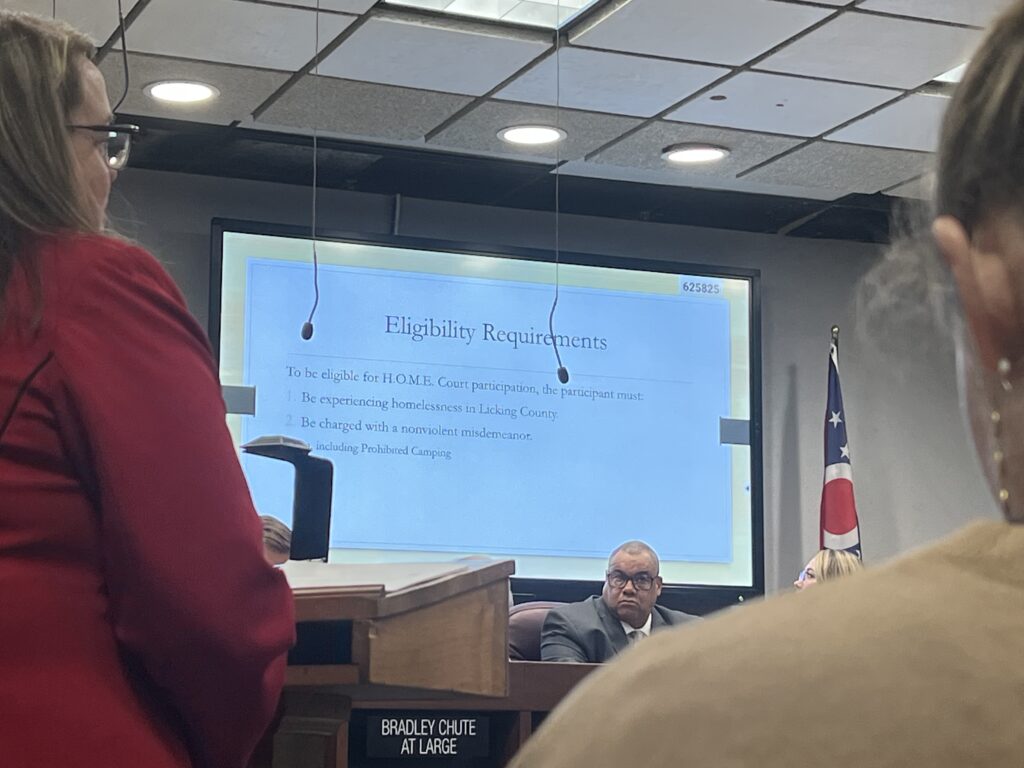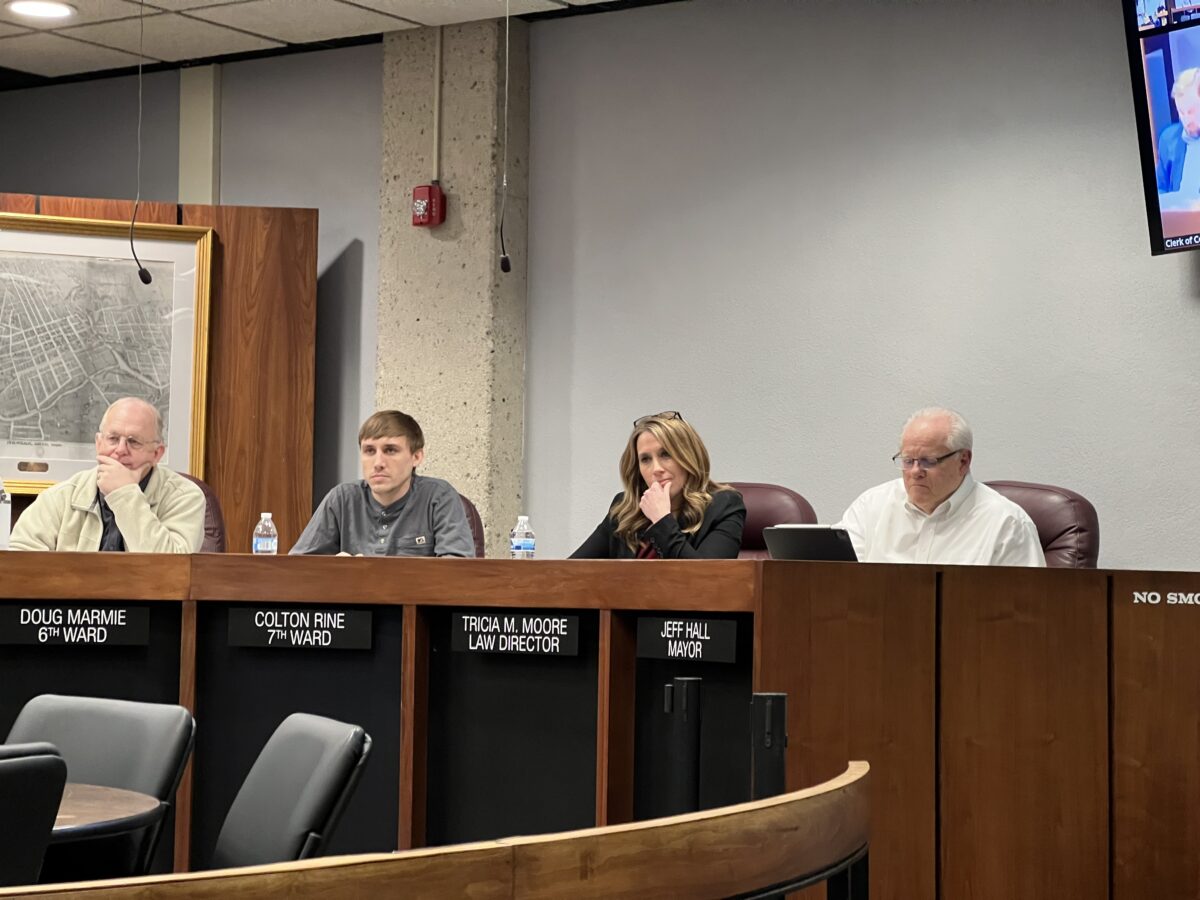Five months after Newark City Council voted to implement legislation to criminalize public camping, the city unveiled plans for a “diversion” program through a “HOME Court,” at the Monday, March 3, council meeting.
The court within the Licking County Municipal Court is designed to allow unsheltered defendants an alternative pathway, called “diversion” in legal terms, to avoid fines and jail time – and a criminal record.
“HOME,” or “Housing Opportunities through Municipal Engagement” was a term devised by the program creators, Newark City Law Director Tricia Moore and Assistant Law Director Melanie Timmerman. The court aims to connect people with the appropriate service providers – organizations that can help with housing, health care, transportation and jobs, among other things – in Licking County and ensure they are making progress.
The HOME Court proposal was a significant factor in Heath City Council’s recent Feb. 18 decision to approve a similar “camping ban” ordinance.
“This community wants to help people,” Moore said to the Newark City Council. “Let’s get everybody on the same page and let’s have everybody who wants to help be able to help.”
Moore and Timmerman have met with churches, service providers, universities and nonprofits to enlist their suggestions and assistance with creation of the program.
“We’ve tried to pull in as many resources as we can to look at creative solutions. We’ve also talked with other municipalities who are considering prohibiting camping ordinances as well, and talked to them about engagement with HOME Court,” Timmerman said during the presentation.
The specialized docket is “voluntary,” meaning those eligible for the HOME Court will have a choice to enter this process or the usual criminal trial. Under the criminal process, first offenses would be a minor misdemeanor punishable by a fine up to $150, with further offences citing 30-60 days of jail time as well as further fines of up to $250 per offense.
The goal of the initial bill, Newark City Council members said, was not to criminalize homelessness in the community, but rather to provide “another tool in the toolbox” for law enforcement officers.
“We’re not trying to throw people in jail for being homeless,” Moore said to the council members.
The HOME Court will meet every Wednesday at 11 a.m., and along with 29 proposed service providers, will provide assistance to unsheltered defendants as early as their arraignment hearing, according to Moore.
Service providers in the proposed list include Holy Trinity Lutheran Church, Licking County Champions Network, St. Vincent Haven, Licking County Coalition of Care, Licking County Coalition for Housing, Licking County Transit, Licking County Humane Society, Brightview, DoubleTree hotel, Licking Memorial Health Systems, Licking County Job and Family Services, United Way of Licking County and Ohio Means Jobs Licking County.
“I didn’t agree with [the camping ban] at first, because it was kind of a push, moving too fast, like they needed more time to plan,” said Chris Gargus, the director of Licking County Champions Network, a faith-based addiction recovery organization. “The good thing is, I thought that, and they were already planning in the background.”
“To be eligible for HOME Court, an individual has to be experiencing homelessness in Licking County,” Timmerman said in her presentation on Monday. “We use the federal definition of homelessness to help guide us in that determination, and then that individual also has to have been charged with a nonviolent misdemeanor.”

Cases of violating Ordinance 24-36 that also include other nonviolent misdemeanors will be reviewed on a case-by-case basis. The HOME Court will look at any past charges the individual has had, as well as the severity of their current charges.
A charged individual will then attend an arraignment hearing in the Small Claims courtroom at the Licking County Courthouse. They will have to make a decision whether to enter the HOME Court or to continue with criminal processing.
Service providers will be in attendance for the individual, and a boxed lunch will be provided by DoubleTree. Hygiene and other nonperishable kits will also be available, according to Timmerman.
“We will have several different service providers who have said, ‘We want to be there and engage with these participants right away,” she said.
By entering the HOME Court, a defendant enters a plea agreement to plead guilty to the crimes, Timmerman said. Their sentence is then held in abeyance, and a diversion is ordered by the court. Judge Teresa Liston will set the diversion term, which will vary from 30 to 180 days based on the offense they are charged with.
“Judge Liston was a champion of this court from the get-go,” Timmerman said. “She’s already well-versed and has some familiarity with some of these folks that we will be seeing in HOME Court.”
The HOME Court would also give individuals the opportunity – once the program is completed – to have their charges expunged from the legal system.
The suspended charges and expungement process is required by law to be a part of the HOME Court due to the ordinance’s passing last year.
“I don’t think there should be an ordinance,” said Trina Woods, the director of the Licking County Coalition for Housing. “However, since there already is, we’re going to work with it and make sure that LCCH is a part of the solution to help these folks hopefully get these charges expunged and get into permanent housing.”
Chad Brown, the Licking County Health Commissioner, has provided HOME Court with a program coordinator, and Moore and Timmerman said they have worked with Mount Vernon Nazarene University to have some of their social work master’s degree students serve as interns.
A key aspect of the new HOME Court program is progress. Moore and Timmerman plan to ensure participants are “engaging,” saying they will request a “status report,” submitted to the court monthly. A “program coordinator” will work with the service providers, defense counsel and the participant to update the court on that individual’s progress, and whether they have “complied” or “engaged” with the program or service providers offered to them.
Read more: Newark community drop-in center at Holy Trinity Lutheran Church seeking volunteers, support
Donna Gibson, the director of Holy Trinity Lutheran Church’s Community Drop-In Center, was one of the two community members who spoke during the council meeting. She suggested to the council members that a shower could also be offered to participants when they arrive for their arraignment.
“A shower could be the difference between being employed or not,” she said. “We need to build their self-esteem […] But I’m really pleased, so thank you.”
“Let’s talk,” said Moore to Gibson after the meeting had ended.
Moore is also open to the possibility of expanding the program even further to potentially include personal care.
“Hopefully, we can get everyone involved and on the same page,” she said. “I’ve started talking to barbers and beauticians.”
The new program also sets out to assist those who are unsheltered for purely financial reasons. Ohio Means Jobs Licking County has partnered with the program, and some of the service providers are also potential employers, according to Moore.
“We were at the apartment association meeting, and we had a guy say, ‘I can hire people to mow grass.’ We also have Chris Gargus, who puts people to work for the Champions Network,” she said.
Gibson stressed to Moore that the solution cannot come overnight, and that she still wants to have more conversations with HOME Court to assist the program.
Even though the community is divided on the necessity of criminalization, Newark City Council believes that HOME Court is a step in the right direction, with most council members opting to voice their appreciation at the end of the meeting.
“This is a great idea, and the thing I love about it is to create some narrative,” said council member Beth Bline, who represents Newark’s second ward. “Also the thing about a narrative is that it finally is that person’s choice.”
“I want to thank [Moore] and [Timmerman] both for what you’ve gotten started,” said at-large council member Bill Cost Jr., who was the sole vote against the ordinance back in October. “It just feels really good to see something moving in that direction.”
On Feb. 18, the Newark Police Department told The Reporting Project that Newark officers had yet to cite anyone under the ordinance approved in October.
Owen Baker writes for TheReportingProject.org, the nonprofit news organization of Denison University’s Journalism program, which is supported by generous donations from readers. Noah Fishman contributed to this reporting. Sign up for The Reporting Project newsletter here.

